Education
Celebrating Prof. Livingstone Walusimbi’s Legacy: A Call for Linguistic Innovation and Digital Transformation
Published
12 months agoon
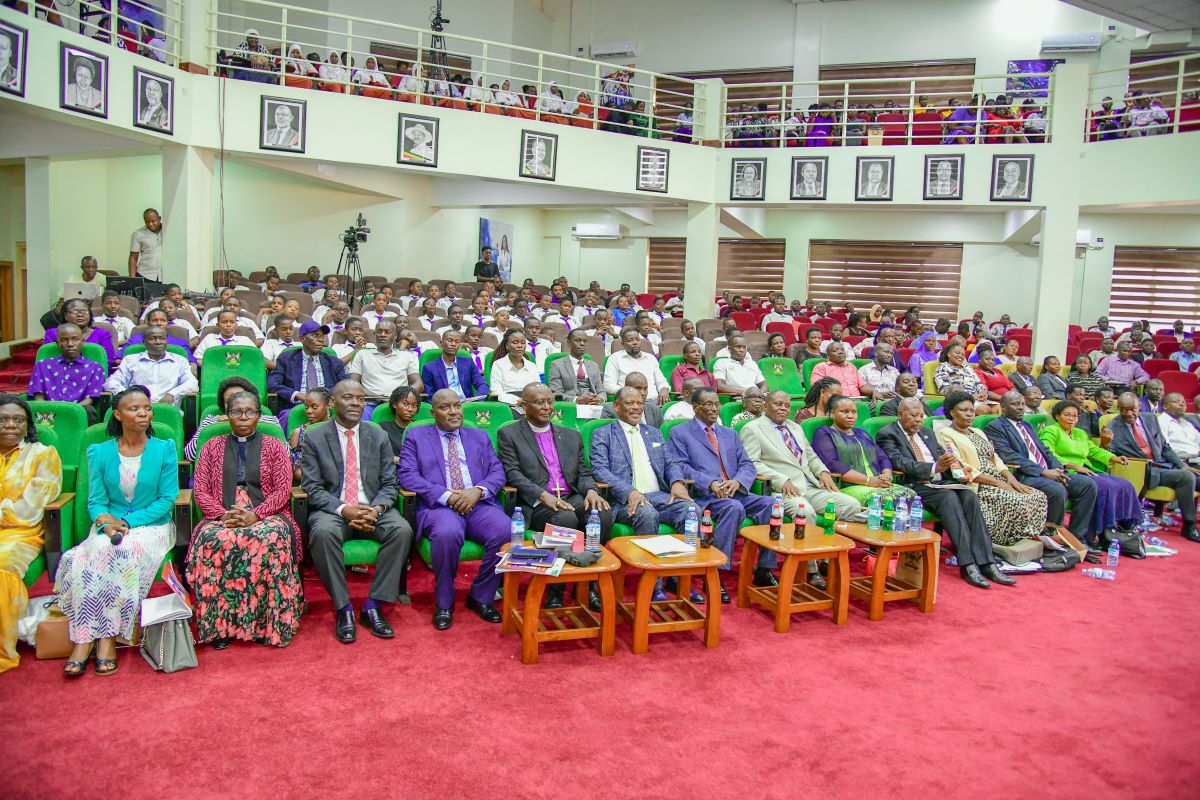
Makerere University College of Education and External Studies in partnership with the Buganda Kingdom Ministry of Heritage and Palaces hosted an inaugural memorial lecture to honour the late Professor Livingstone Walusimbi, whose ground breaking contributions to African languages have left an indelible mark on the field. Themed “Building Sustainable Futures: Bridging Prof. Walusimbi’s Linguistic Legacy with Digital Transformation,“ the event provided a profound moment of reflection on the transformative power of language and its pivotal role in shaping societies.
Held on February 27, 2025 at Makerere University School of Public Health Auditorium, the memorial lecture provided a befitting platform to celebrate Prof. Walusimbi’s legacy and selfless service in advocating for and advancing the recognition of Luganda and African languages at Makerere University and other academic institutions. The month of February is dedicated to mother tongues and African languages. It was therefore a perfect decision to hold the inaugural memorial lecture during the month of February. According to Wikipedia, the International Mother Language Day is a worldwide annual observance held on 21st February to promote awareness of linguistic and cultural diversity and to promote multilingualism.
The hybrid lecture featured Anthems led by Buddo Senior Secondary School, a prayer led by Rev. Juliet Ssekamate from Wampeewo Church of Uganda, and a powerful poem with words that symbolized the good works of Prof. Walusimbi and a pledge by those he mentored and the future generations to keep his legacy alive, recited with love and emotion by Mr. Aloysius Matovu Joy (a former student of Professor Walusimbi), speeches, a keynote speech and a panel discussion.
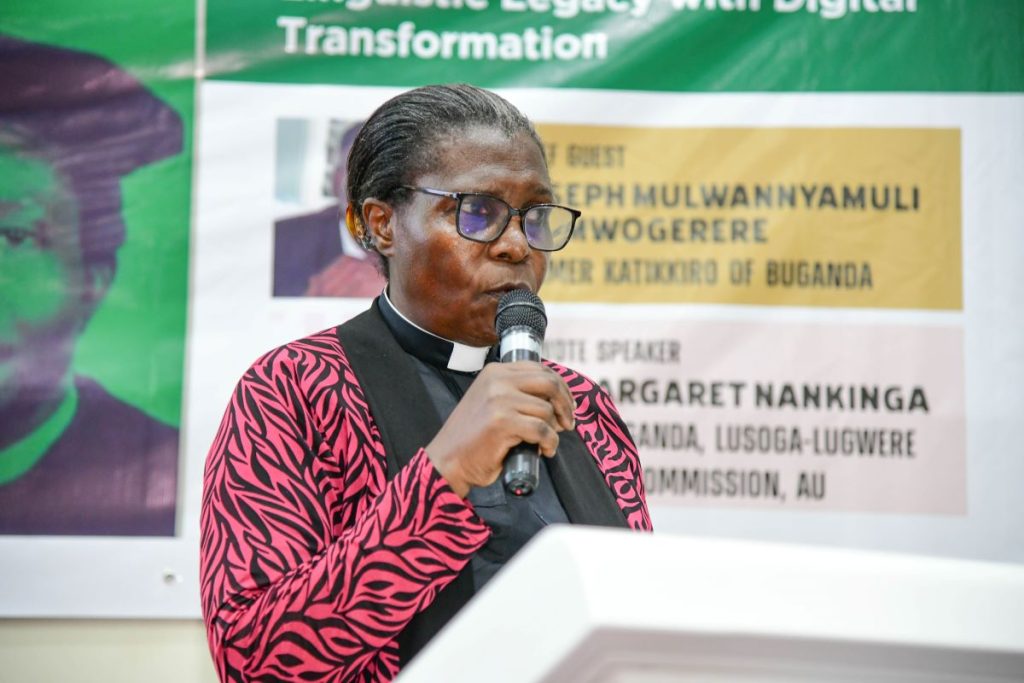
The lecture brought on board dignitaries from Buganda Kingdom and other cultural institutions, the family of Prof. Walusimbi, the academia, scholars, educators, learners from primary schools, students and teachers from various secondary schools, institutes and universities, Bakayimbira Dramactors, the media, individuals mentored by Prof. Walusimbi, alongside leading experts in linguistics. The lecture presented a golden opportunity to honor his legacy while exploring the continued relevance of his work in the context of today’s rapidly advancing digital age.
Prof. Livingstone Walusimbi’s academic journey was marked by an unwavering dedication to linguistic excellence and education. Born on 23rd March 1935, his early experiences in the Ugandan school system during the 1940s and 1950s laid the ground work for what would become a lifelong vocation in education. Beginning his career as a Grade III teacher at the National Teachers’ College in Kyambogo in 1958, he demonstrated from the outset a deep-seated passion for teaching and learning-an attachment that would drive him to pursue advanced studies abroad, ultimately earning him a certificate from Leicester University in 1962, a diploma from the University of California, Los Angeles in 1969, and culminating in a master’s degree in Linguistics in 1971 followed by a PhD in 1976.
Through these rigorous academic pursuits, Prof. Walusimbi not only solidified his place as a distinguished scholar, but also laid the foundation for his lifelong contributions to linguistics and language education.
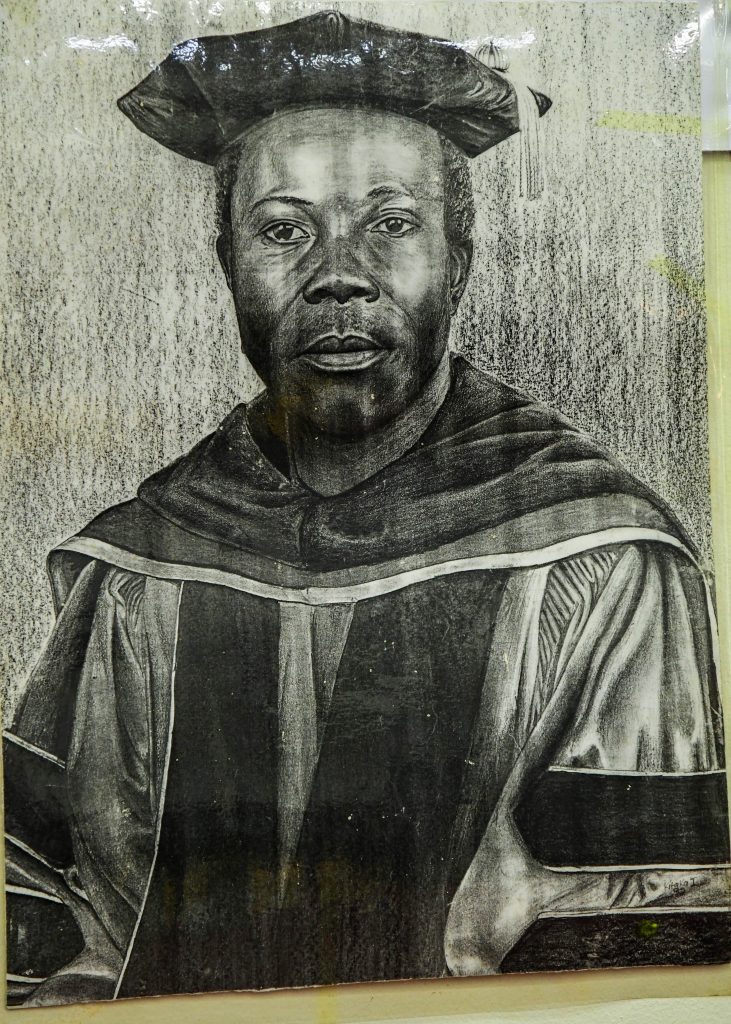
Beyond his academic achievements, Prof. Walusimbi played a pivotal role in integrating Uganda’s indigenous languages into the university’s curriculum. Understanding the crucial need to preserve and promote the nation’s linguistic heritage, he spearheaded the introduction of courses in Luganda, Runyakitara, Ateso, and Luo. His efforts not only enriched the academic landscape at Makerere University, but also made a significant contribution to the cultural vibrancy of Uganda’s higher education system.
The Chief Guest, Owek. Joseph Mulwanyammuli Ssemwogerere, former Katikkiro of Buganda Kingdom, lauded Prof. Walusimbi for his tireless efforts in promoting African languages, particularly Luganda, which continue to shape Uganda’s linguistic landscape. Speaking on behalf of the Katikkiro of Buganda Kingdom, Charles Peter Mayiga, Owek. Mulwanyammuli offered profound reflections on the pivotal role of language in preserving culture and driving socio-economic development.
At the core of his address was the critical role of language in defining identity and fostering unity in the community. “A community without language and culture is a lost group,” Owek. Mulwanyammuli stated, emphasizing the necessity of nurturing indigenous languages as vital to the socio-economic transformation of societies. African languages, he argued, are not only markers of identity, but also powerful tools for development, promoting community cohesion and progress.
The former premier celebrated Prof. Walusimbi’s remarkable contributions, noting that he was a steadfast advocate for the academic recognition and preservation of African languages, particularly at a time when many dismissed them as unworthy of scholarly attention. Prof. Walusimbi’s groundbreaking work to have Luganda and other indigenous languages taught at universities has created a lasting impact, resulting in a generation of experts in these fields. His unwavering commitment has shaped the academic landscape, leaving behind a legacy of linguistic scholars continuing his mission.
Owek. Mulwanyammuli also addressed a contemporary challenge—the misconception that native speakers of a language are automatically experts. He stressed the importance of formal education in indigenous languages, particularly to guide the youth who are increasingly influenced by social media and globalization. “We need people like Professor Walusimbi to guide us, especially the youth,” he remarked, underscoring the need for academic support in teaching indigenous languages and culture.
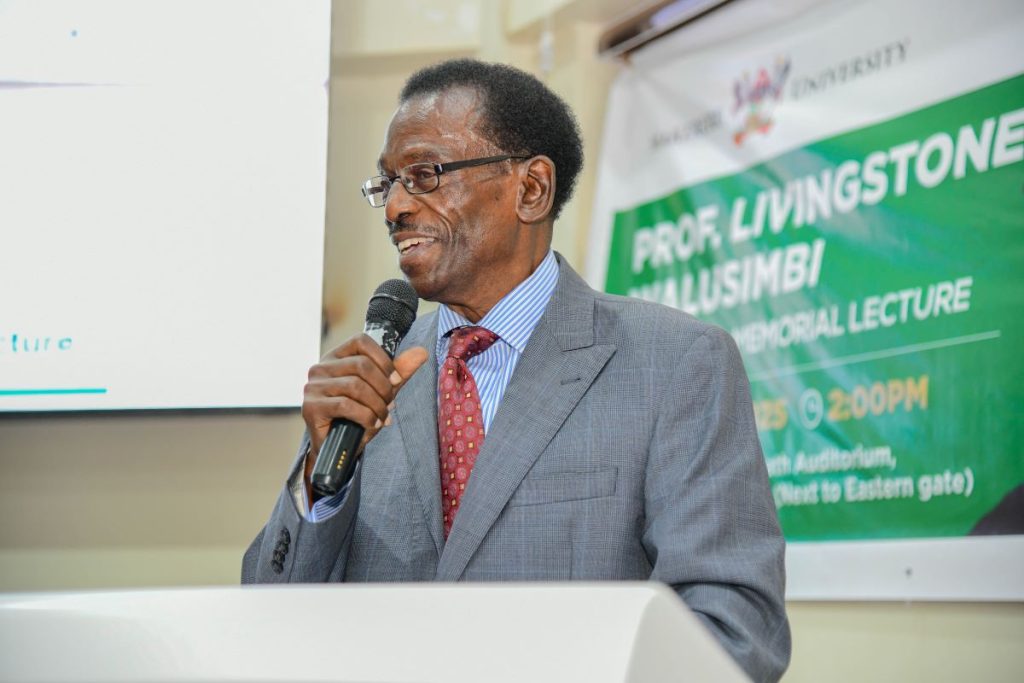
Owek. Mulwanyammuli thus called for continued research into the relationship between indigenous languages, culture, and development. “We need to move with the times,” he urged, highlighting the potential of integrating indigenous languages into the evolving digital landscape. By doing so, he believes African languages can play a pivotal role in the continent’s economic and political transformation, serving as bridges to new technologies and innovations.
In her keynote address, Ms. Margret Nankinga, Coordinator of Luganda, Lusoga, and Lugwere Languages at the Language Commission of the African Union, emphasized the contributions of Prof. Walusimbi to the teaching of Luganda and African languages at Makerere University and other Universities as well as key issues of cultural identity, education and technological advancement.
She highlighted the impact of colonial-era policies that sought to diminish the role of mother tongues in education, labeling them as hindrances to academic success. These attitudes, which punished children for speaking their native languages, still re-occur today, inhibiting the growth of linguistic diversity. She stressed that Prof. Walusimbi defied these odds, dedicating his career to proving that African languages—specifically Luganda—could be vehicles for higher education and intellectual discourse.
She portrayed the significance of linguistic literacy, urging a revitalization of indigenous languages in both educational and technological contexts. Ms. Nankinga highlighted how, despite the historic stigmatization of mother tongues, languages such as Luganda have demonstrated adaptability. Prof. Walusimbi’s pioneering work in introducing Luganda at the university level exemplifies the potential of African languages to carry complex and high-level knowledge.
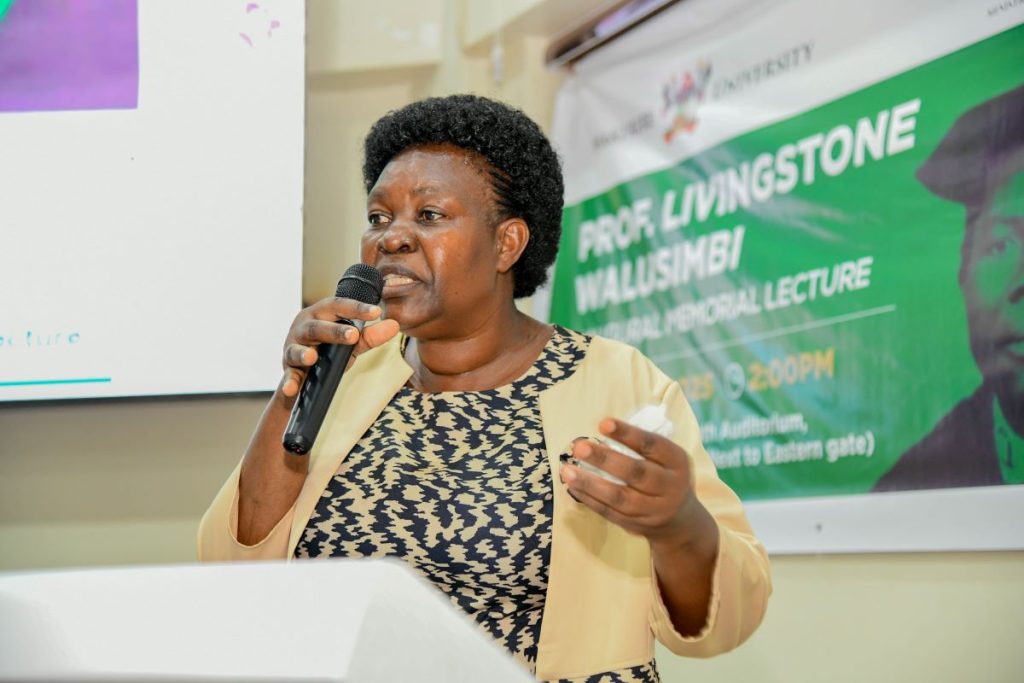
Drawing attention to the challenges of the 21st century, she warned of the digital divide, where African languages are at risk of being excluded from the digital revolution. “Are we capable of migrating our languages into the digital sphere?” Ms. Nankinga asked. She emphasized that in an age where social media, artificial intelligence, and ICT dominate global communication, it is crucial that African languages are not left behind. To preserve their cultural heritage and ensure their relevance in the future, African languages must evolve alongside technology.
“In this migration, someone may be sitting right next to you, yet they’re not truly present. They are in another world—the world of social media. Their attention is consumed by social media. Their body may be here, but their spirit and everything else have already migrated—that’s the term they use. So, how do we ensure that as they migrate, they carry our language with them? How do we ensure they carry our cultures? How do we ensure that our indigenous knowledge also migrates to the digital world, to social media, and the Internet?” she questioned.
Ms. Nankinga also underscored the importance of policy reform, calling for a shift in attitudes toward language education. She advocated for policies that provide economic value to indigenous languages and support their integration into the digital landscape. The example of the Bible being translated into 22 Ugandan languages was a powerful illustration of the richness of these languages and their capacity to convey complex ideas. Yet, much more needs to be done, she argued, particularly in the realms of scientific research and technological innovation.
She advocated for collaborative efforts among universities, researchers, and policymakers to bridge the gap between traditional knowledge and modern innovation. “If we are to evolve, let us start with our languages,” Ms. Nankinga guided. She also pointed out the need for researchers to present their findings in African languages, making academic knowledge more accessible and relevant to local communities.
Prof. Barnabas Nawangwe, the Vice Chancellor of Makerere University, emphasized the significant impact of Prof. Walusimbi’s work on both the academic and cultural realms. He remarked that when Prof. Walusimbi joined Makerere University as a tutorial fellow in 1972, he entered an academic environment that had not yet fully recognized the intrinsic value of Ugandan and African languages. Prof. Walusimbi advocated for the inclusion of indigenous languages in the university curriculum, beginning with the introduction of Luganda as a formal subject in 1976.
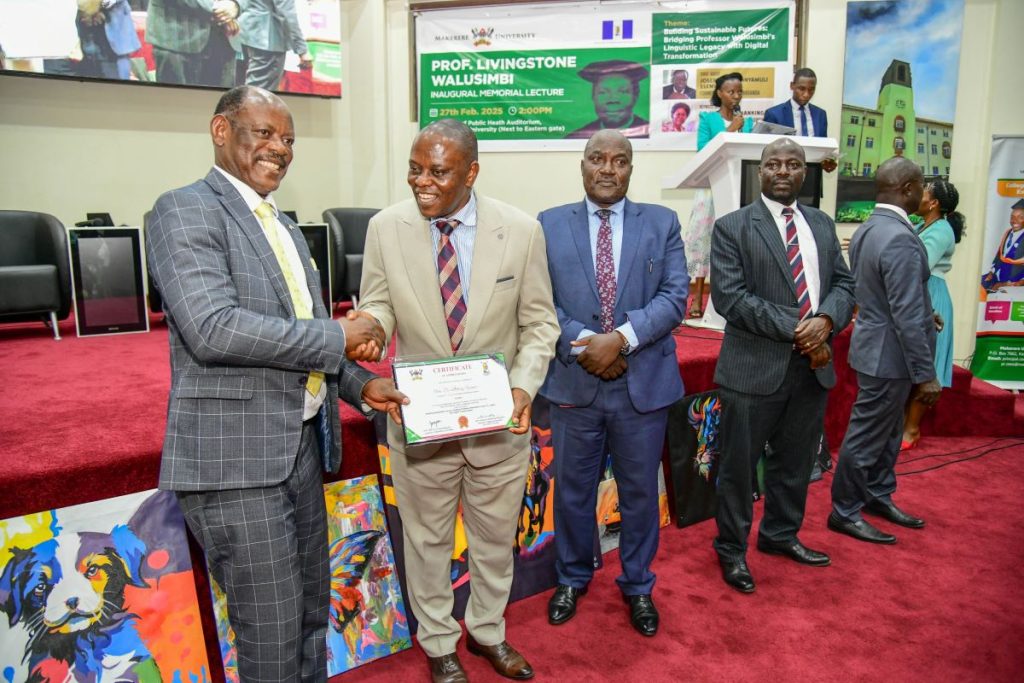
The Vice Chancellor stated that Prof. Walusimbi’s academic journey at Makerere University exemplified both scholarly excellence and an unwavering commitment to the advancement of indigenous languages. His rapid progression from tutorial fellow to lecturer in 1975, senior lecturer, and ultimately, the first Ugandan to attain a professorship in linguistics in 1992, stands as a testament to his dedication and intellectual rigor. He explained that Prof. Walusimbi’s contribution to Makerere University extended far beyond his exemplary academic achievements.
“Recognizing the importance of community engagement, he established platforms such as the Baganda Nkobazambogo Students Association and co-founded the Luganda Language Society (Ekibiina ky’olulimi oluganda). These initiatives not only nurtured linguistic scholarship, but also promoted cultural pride and heritage among generations of Ugandans. His persistent outreach has indelibly changed the cultural and educational landscape of our nation,” Prof. Nawangwe said.
Prof. Nawangwe announced the University’s exciting new initiative that is aligned to integrating technology with language preservation. He highlighted a research project by researchers at Makerere University at the College of Education and External Studies who were developing an application to transcribe the Luganda language in real-time. This tool was designed to enable those with hearing impairments to read spoken Luganda on their screens. Prof. Nawangwe stated that this project was a true reflection of the kind of research-driven innovation that Prof. Walusimbi had championed throughout his life.
Prof. Anthony Muwagga Mugagga, the Principal of the College of Education and External Studies represented by Prof. Paul Muyinda Birevu, acknowledged Prof. Walusimbi’s instrumental role in establishing the Department of Humanities and Language Education at the College. He stated that Prof. Walusimbi’s visionary leadership played a pivotal role in integrating rigorous linguistic scholarship with progressive pedagogical practices, creating a strong foundation for the study of languages. He added that by championing interdisciplinary research, Prof. Walusimbi set a benchmark for academic excellence in language education.
“His foresight and leadership were critical in leading these language studies in our curriculum. Through incorporating rigorous traditional linguistic scholarship in progressive pedagogical practices, he not only established a robust academic foundation for the study of languages, but also set a standard for interdisciplinary research. His commitment to multi-term education has reshaped education practices in Uganda,” Prof. Anthony Mugagga stated.
The Principal noted that Prof. Walusimbi was at the forefront of advocating for policies that promoted language instruction in local dialects, ensuring that Ugandan and other indigenous languages were integrated into formal education. This advocacy helped position language as more than just an academic discipline but as a fundamental tool for cultural preservation and social cohesion.
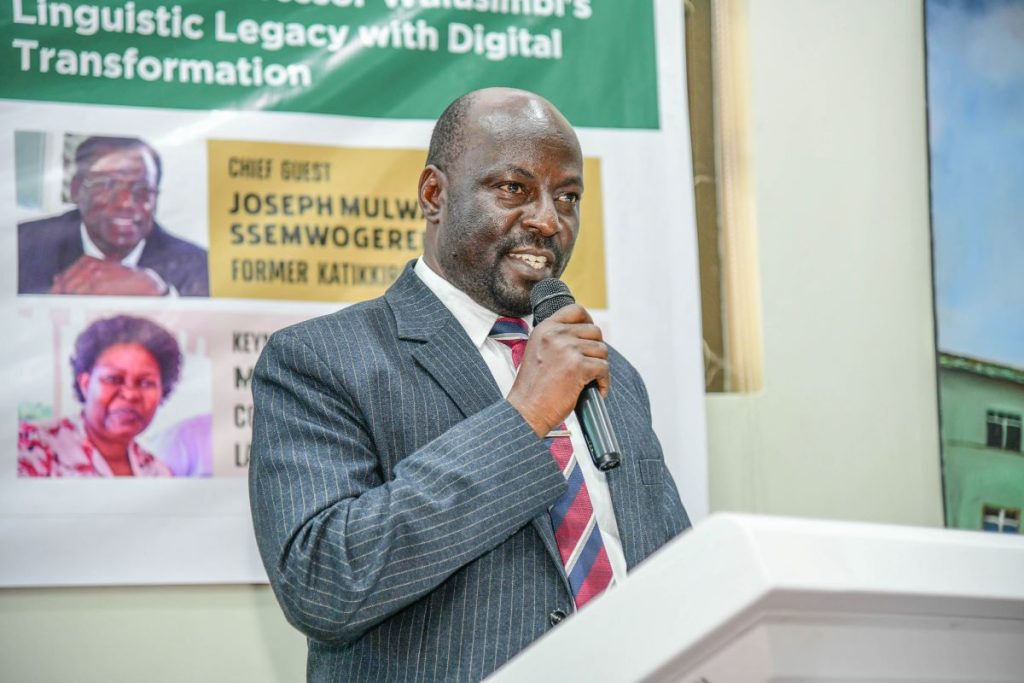
On a personal note, Prof. Mugagga shared that Prof. Walusimbi was not just an outstanding academic but also a compassionate mentor whose guidance left a profound impact on many scholars, including himself. He credited the late professor for instilling in him the belief that education transcends textbooks and lecture halls. According to him, Professor Walusimbi’s mentorship emphasized the importance of curiosity, identity, and ethical responsibility in academia. He noted that the late professor’s dedication to blending traditional values with innovative educational practices made him a model educator who fostered equity, intellectual rigor, and mutual respect among students and colleagues alike.
The Minister for Heritage and Palaces in the Buganda Kingdom, Dr. Anthony Wamala acknowledged the lasting contribution of Prof. Livingstone Walusimbi to the development of his mother tongue, to be specific Luganda.
The Minister described Prof. Walusimbi as the “father of modern Luganda language,” underscoring his pivotal role in ensuring that the study and teaching of Luganda received the academic recognition it deserved. “Through his effort in advocacy and mentorship, the teaching of our own language gained recognition at this great centre of academic excellence,” the Minister said.
The Minister emphasized that Prof. Walusimbi’s contributions went far beyond academic scholarship. His work laid a critical foundation for the continuity of Uganda’s heritage and cultural identity. “It is therefore incumbent upon us, the living, to protect and extend the vision and leadership of Professor Walusimbi,” the Minister urged, stressing the need for continued efforts in supporting the teaching and further development of Luganda.
Taking note of the modern technological advancements today, the Minister highlighted the potential to use these tools to further the transmission of Luganda. “We are blessed to live in a world with numerous technologies that we can exploit to pass on our language,” he remarked, pointing to mobile applications as one example of how technology could be harnessed to make learning and teaching Luganda more accessible, especially for younger generations and those from outside the region wishing to learn.
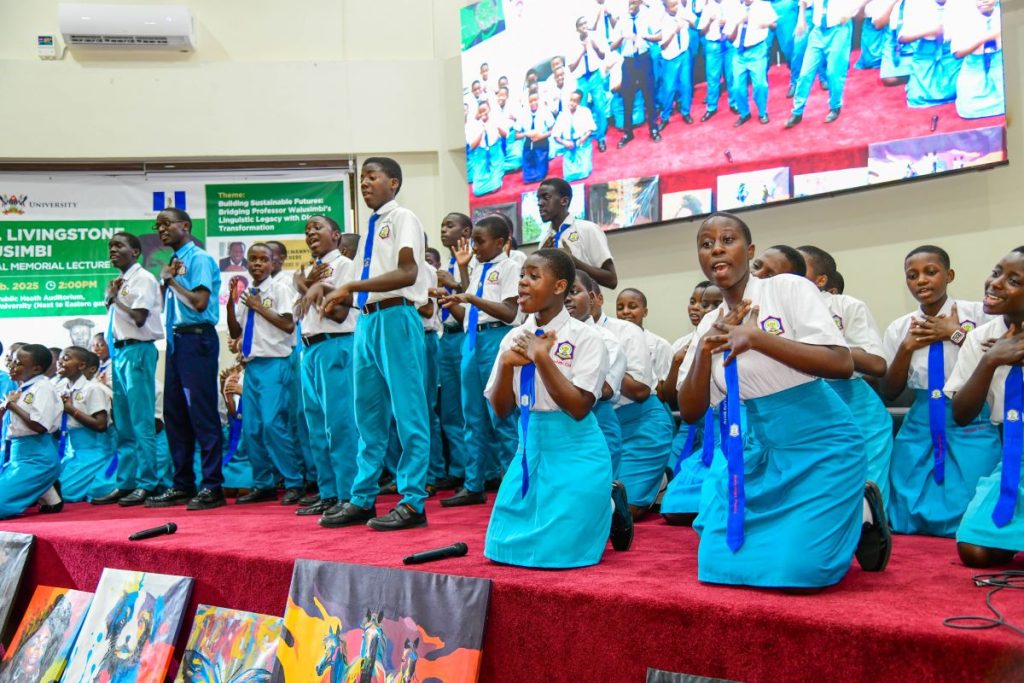
The Minister called on everyone, to not only celebrate Prof. Walusimbi’s achievements, but also to commit to embodying the values he championed. “Let us strive for excellence in our pursuits, serve our communities with proportion, and use our knowledge to build a more just and equitable world,” he stated. By doing so, the Minister affirmed that Prof. Walusimbi’s legacy would continue to inspire and guide future generations in the preservation and growth of Uganda’s linguistic and cultural heritage.
As the first recipient of a PhD in Luganda from Makerere University and the only professor specializing in the subject, Prof. Fred Masagazi Masaazi, the Chairperson of the Organizing Committee for the inaugural lecture and a former student of Prof. Walusimbi praised his unwavering commitment to the development of Luganda and other African languages. He underscored the significance of Prof. Walusimbi’s work in advancing linguistic scholarship. He expressed the collective aspiration to see other Ugandan and African languages develop to the level of Luganda, highlighting how the late Professor’s efforts extended beyond Makerere University to impact the broader linguistic and educational landscape.
He said, “It is our wish to see Uganda and other African languages develop the way Luganda has developed. We are here to instruct on work that has been done by Prof. Livingstone Walusimbi.”
Prof. Masagazi Masaazi applauded the invaluable contributions of Uganda’s language teachers, recognizing their role in sustaining and expanding linguistic education through research, teaching, and publication. He further reflected on Professor Walusimbi’s groundbreaking achievements, explaining that his mentor did not merely study languages for academic interest, but worked tirelessly to develop structured programs in Luganda. Prof. Walusimbi, initially trained in English language and linguistics, conducted extensive research and pioneered the creation of Luganda language programs.
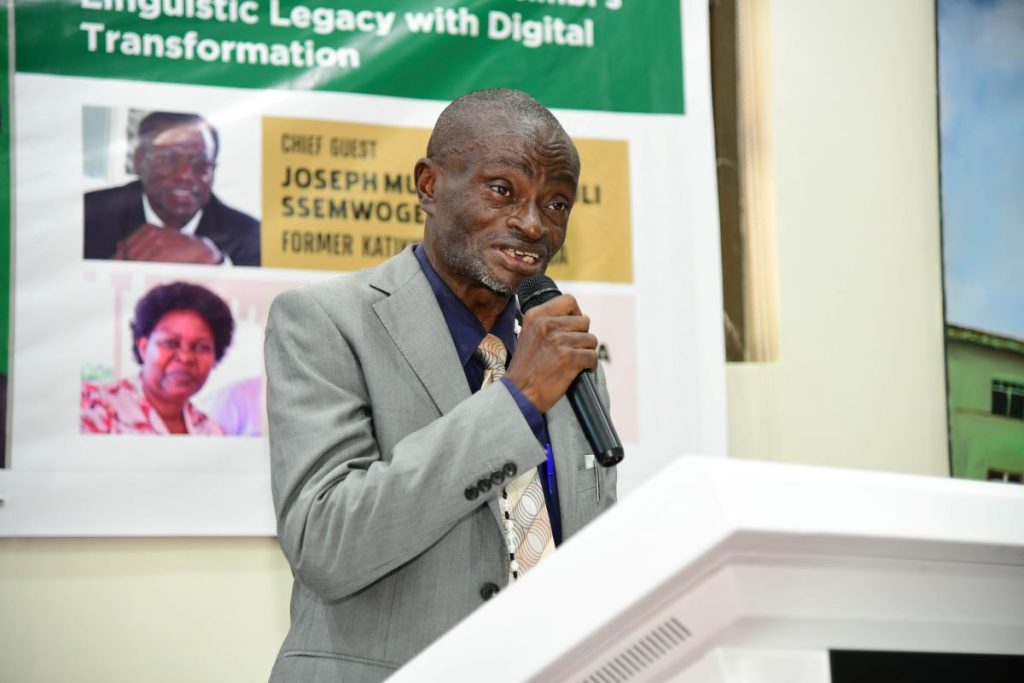
Mr. Aloysius Matovu Joy, a multifaceted Ugandan artist, one of the directors of Bakayimbira Dramactors and a former student of Prof. Walusimbi, in a poignant poetic tone called the populace to preserve and nurture the Luganda language, the mother tongue of many Ugandans. He re-echoed the importance of passing the language on to future generations, encouraging parents to teach their children not just to speak it, but to gain expertise and qualifications in it. He called for a broader recognition of the language, urging for books and knowledge in Luganda to multiply, thus safeguarding its future.
He recounted the invaluable role Professor Walusimbi played in his life, describing him as a nurturing figure who never let his students wither but instead helped them flourish. “He watered us, and we blossomed,” said Mr. Matovu, highlighting how the professor instilled in his students a profound love and respect for Luganda. According to Mr. Matovu, it was Professor Walusimbi who helped elevate the language, allowing it to surpass others, especially those that historically sought to suppress it.
Mr. Matovu praised Professor Walusimbi for being a fountain of wisdom, comparing him to a stone that, once ordinary, transformed into a mighty rock that stood out among others. “You became a father, mother, and grandparent to us, shaping us into the people we are today,” he said, conveying deep respect and admiration. He also underscored how Prof. Walusimbi not only made his students experts in the Luganda language, but also helped them become teachers and leaders in their own right.
Dr. Alice Joy Nabalamba, daughter of the late Prof. Walusimbi, on behalf of the family, expressed deep gratitude for the recognition of her father’s legacy. She emphasized that Makerere University was more than just a workplace for her father—it was his second home for over four decades. She extended special thanks to the organizing committee for their unwavering commitment to ensuring that Professor Walusimbi’s work is celebrated and remembered.
Reflecting on his career, Dr. Nabalamba described her father as more than an educator; he was a mentor and a guardian of language and culture. His belief that language is deeply intertwined with identity and heritage fueled his relentless efforts to preserve indigenous languages. As an advocate for linguistic preservation, his work extended beyond academia to global platforms such as UNESCO, where he collaborated with experts to safeguard endangered languages. Dr. Nabalamba noted that he was acutely aware that the disappearance of a language equated to the loss of history, wisdom, and the very essence of a people.
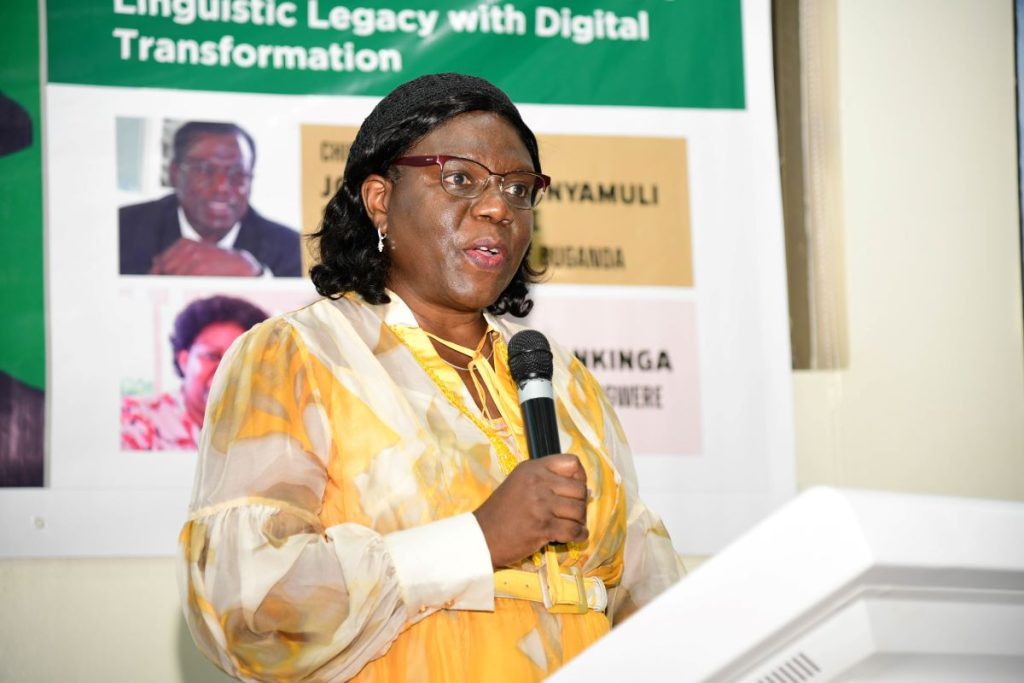
Dr. Nabalamba called upon the multitude to carry forward her father’s vision. She urged scholars, educators, and language enthusiasts to continue his work by promoting indigenous languages, fostering education, and embracing kindness. In her words, “Today, as we honor him, I know he would not want us to dwell in sorrow. Instead, he would want us to continue with his work—to teach, to preserve, to serve, and most of all, to be kind to one another.”
In a panel discussion moderated by Dr. David Kabugo, the panelists namely Dr. Prosperous Nankindu, Dr. Ronald Kizito, and Prof. Abasi Kiyimba shared insights into the linguistic legacies of Professor Walusimbi and how to continue his work in preserving and promoting African languages in the digital era.
Dr. Ronald Kizito pointed out Prof. Walusimbi’s role in introducing Luganda at Makerere University, which later spread to other institutions. He noted that Prof. Walusimbi’s 1976 PhD dissertation from UCLA continues to be a valuable resource for their work, especially in training computers to recognize the syntax, grammar, and structure of Luganda. He emphasized how this laid the foundation for teaching computers to understand and process Luganda, making it accessible on a global scale. He also shared ongoing efforts at Makerere University College of Engineering, Design, Art and Technology, where they are working on teaching machines to read, translate, and speak Luganda, ensuring that the younger generation can interact with technology in their native language.
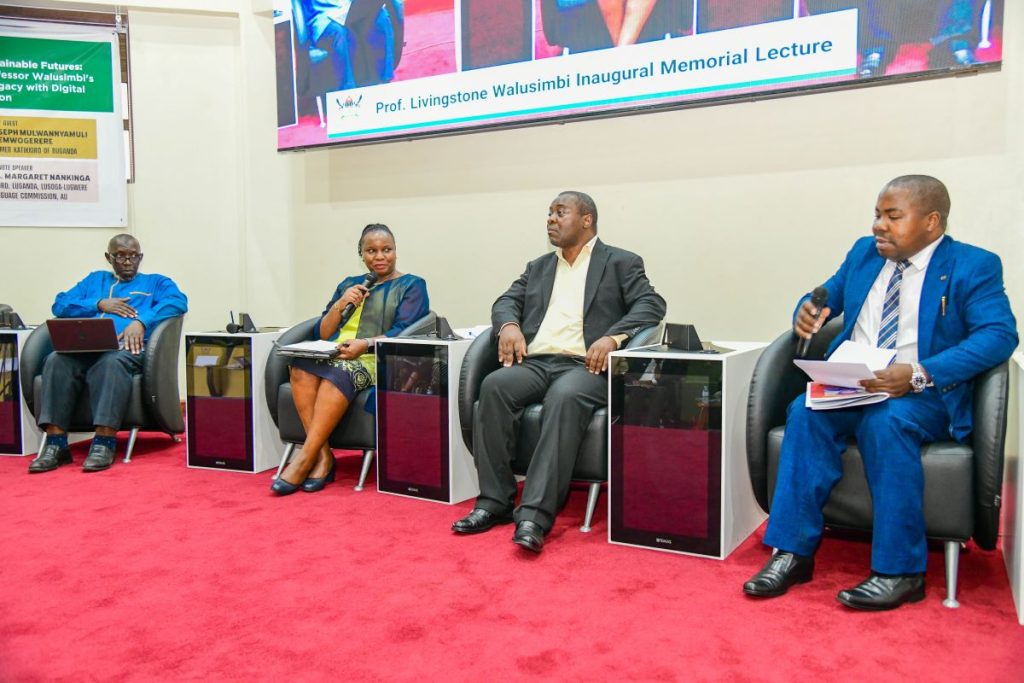
Dr. Prosperous Nankindu mentioned the importance of preserving and promoting Luganda, highlighting the foundational work of Prof. Walusimbi in developing Luganda studies. She acknowledged his efforts in standardizing Luganda grammar and literature, which have greatly influenced language education in Uganda. Dr. Nankindu stressed the need for continued research and technological advancements to ensure that Luganda remains relevant in the digital age. She called for more initiatives to integrate Luganda into modern communication, education, and artificial intelligence, ensuring its sustainability for future generations.
Prof. Abasi Kiyimba focused on Prof. Walusimbi’s great work in developing the Luganda language and its literature. He explained how Prof. Walusimbi helped set rules on how Luganda should be written and spoken correctly. He also worked on creating dictionaries and improving the language for teaching and learning. Prof. Kiyimba called upon the audience to continue researching and using modern technology to keep Luganda strong and relevant in schools and everyday life.
The well-attended lecture moderated by Ms Ritah Namisango and Dr. Muhammad Kiggundu Musoke from the College of Education and External Studies, ended with a prayer led by Bishop Hannington Mutebi, a member of Prof. Livingstone Walusimbi’s family.
You may like
Education
Facilitating Access and Participation through Higher Education Access Programmes and Connected Education for Students with Refugee Backgrounds: A Global South Delphi Study
Published
2 months agoon
December 19, 2025
On 17th December 2025, a Delphi workshop was convened at Kampala Kolping Hotel, providing a collaborative platform for dialogue on standardisation and harmonisation of Higher Education Access Programmes (HEAP) across institutions, alongside strategies for portability and verification on demand through a HEAP Digital Passport. Discussions centered on accreditation, diversification of delivery and learner support, and future scenarios for HEAP and Connected Education.
Expert panelists underscored the urgent need for:
- Standardised HEAP frameworks across universities to ensure consistency in admission pathways.
- Harmonisation of HEAP curricula, duration, and procedures to eliminate barriers that hinder access and transition.
- Development of a HEAP Digital Passport enabling portability of credentials, secure digital verification, and integration with national qualification frameworks and international recognition systems.
Uganda, is one of the leading refugee-hosting countries with inclusive education policies, faces challenges in ensuring equitable access and participation for students with refugee backgrounds. While some universities offer HEAP as a bridging programme for marginalized learners, variations in programme design, delivery, and support systems still exist, which may lead to violations of accreditation. This calls for urgent standardisation and harmonisation to strengthen HEAP as a recognized transitional pathway into higher education.

Funded by Education Beyond Borders, researchers from Makerere University and the University of Edinburgh engaged stakeholders from public and private universities in Uganda through participatory workshops and expert meetings. This Delphi Workshop aimed providing a collaborative platform for dialogue on standardisation and harmonisation of Higher Education Access Programmes (HEAP) across institutions, alongside strategies for portability and verification on demand through a HEAP Digital Passport. Discussions centered on accreditation, diversification of delivery and learner support, and future scenarios for HEAP and Connected Education. The project is led by Dr. Rovincer Najjuma (Principal Investigator), with co-PIs Dr. Rebecca Nambi and Dr. Michael Gallagher.
Listening to experiences and co-creating solutions

Opening the workshop, Dr. Rebecca Nambi, a Senior Lecturer at Makerere University and Co-Investigator of the project, emphasized that the engagement was not about formal presentations, but about listening to experiences of students with refugee backgrounds that have accessed Higher Education using the HEAP programme and co-creating solutions with Expert Panelists.
Highlighting the persistent disparities in refugee participation in higher education, Dr. Nambi explained that while global and national efforts often focus on primary and secondary education, higher education remains critically under-supported. Drawing on years of research, she observed that refugee participation in higher education has historically stood at three percent (3%), later improving to about seven percent (7%), leaving the highest number of refugees excluded.
“Where do they go if they do not transition to higher education?” she asked. “Who supports them and how do institutions respond when learners arrive with disrupted educational trajectories?”
Shift from mere documentation of marginalization and adversity to practical interventions
Dr. Nambi underscored the importance of moving beyond research that merely documents marginalizationa and adversity. She advocated for practical interventions that improve systems for people with refugee backgrounds and strengthening education for host communities. “Addressing refugee education is part of a broader global agenda shaped by migration, conflict, and labour mobility in several countries.”
Dr. Nambi emphasized that HEAP provides a legitimate pathway for students with refugee backgrounds, and the ongoing adjustments aim to align the program with national standards and student needs.
Central to the discussion was the concept of connected learning, which promotes flexible, blended, and digitally supported education pathways that link learners across institutions, resources, locations, and systems.
Referencing the Makerere University E-Learning Environment (MUELE) as a key enabler of digital and interactive learning between lecturers and students at Makerere University, Dr. Nambi urged other universities to explore such a digital approach to catalyze the delivery of HEAP programmes. She noted that connected education is not solely about technology, but about harmonization, recognition, and collaboration among universities and regulators.
Comparing public and private universities, Dr. Nambi observed that private universities often have more flexible access pathways, and urged that documentation of students’ experiences of HEAP is critical to understanding gaps in provision, delivery and support
“Much of our work has involved examining how Makerere University and other universities are handling access for vulnerable students. We want to document lived experiences, analyze what is working and what is not, and generate evidence that can inform policy and institutional practice,” Dr. Nambi explained.
HEAP Emerging Challenges, lived experiences and future
Moderating one of the key sessions, Dr. Rovincer Najjuma, the Principal Investigator and a Lecturer in Digital Education and the Global South at the University of Edinburgh, guided participants through delphi workshop activities; these included engaging panelists in articulating expectations, uncertainities and risks, and developing future scenarios for HEAP accreditation, diversification of delivery and support and connected education.

Using participatory methods, participants shared insights through post-it notes and group reflections, capturing perspectives from expert panelists, HEI administrators, and students with refugee backgrounds. Dr. Najjuma encouraged an open dialogue, ensuring that student voices, particularly those with refugee backgrounds were centred in the conversation by encouraging them to share their experiences and journeys of participating in HEAP programmes.
The panelists acknowledged that while the HEAC has changed the nomenclature from HEAC to HEAP, programmatic provisions need to evolve, to address the inconsistencies that remain with respect to how institutions implement HEAP, duration, curriculum, and transfer of HEAP credit across institutions. Panelists shared about the critical gaps in awareness, mentorship, orientation, and institutional readiness to implement HEAP in ways that support refugee learners effectively.

On the issues faced by students with refugee status, participants identified several recurring challenges affecting access to and participation in higher education. These included low awareness of the HEAP programmes, fragmented and uncoordinated information dissemination, and difficulties in credential recognition and transfer across institutions and country host-country education systems.
Students highlighted low self-esteem, identity struggles, and stigma, especially where access programmes are perceived as inferior to Advanced High School Certificates. They also cited financial barriers, limited digital access, mental health challenges, and lack of learner-centred teaching approaches.
Key outcomes from the workshop
Panelists outlined key expectations to strengthen access and participation, which included the development of a standardized national HEAP curriculum, with clear and uniform entry requirements, and seamless credit transfer across institutions and host countries, facilitated by the development of HEAP Digital Passport.
Mentorship emerged as a cornerstone of learner support, alongside extended orientation programmes, life skills training, and entrepreneurial education. Participants emphasized the need for blended and online learning, supported by affordable internet access and institutional investment in digital infrastructure.
Policy coherence, stakeholder engagement in policy formulation, and timely communication of reforms were identified as essential for successful implementation. Participants called for gender-sensitive curricula, student representation structures, humane and trauma-informed teaching staff, and adequate learning resources, including reference materials.
HEAP: A Structured Pathway to Higher Education
Dr. Gidraf Joseph Wanjala, Principal of the College of Education, Open and Distance Learning at Kampala International University, highlighted the evolution of access programs in Uganda.
“Historically, the higher education access framework was known as the Higher Education Access Certificate (HEAC). Last year, it was updated to the Higher Education Access Program (HEAP), reflecting a shift from a certificate to a full program, approved by the Ministry of Education and Sports,” Dr. Wanjala said.

He explained that HEAP provides structured pathways for students to progress from diploma to bachelor degree levels, from mature entry to degree programs, and from senior secondary school to higher education. “This program is inclusive of refugee students and all marginalized groups, provided there is funding and space. HEAP supports students not just academically, but also through orientation programs, mental health training, reproductive health education, and gender-responsive support,” Dr Wanjala stated.
Challenging Misconceptions

Dr. Derrick Ssekajugo, Chair of the Special Purpose Committee on Academics and Acting Principal of the College of Economics and Management at Kampala International University, addressed public misconceptions about HEAP.
“Some perceive HEAP—or previously HEAC—as only for students who could not succeed in secondary school. That is not the case. For instance, we have students who initially studied Education but through HEAP transitioned into medicine. Today, they are fully qualified professionals,” Dr. Ssekajugo said.
He also highlighted the pedagogical shift from teacher-centred to learner-centred approaches in secondary education and the need for universities to adapt. “Students entering HEAP come with diverse learning experiences, and universities must adjust to integrate them effectively into competency-based programs,” he noted.
Dr. Ssekajugo added that benchmarking with both local and international institutions is critical to identify gaps and best practices, which inform ongoing program improvements and policy reforms.
HEAP and standardization, accessibility and inclusivity
Sharing their vision for HEAP, panelists recommended standardization, accessibility, inclusivity and foundational nature of HEAP. They advocated for a competence-based HEAP, with a standardized curriculum, offline and online access to resource books and materials, diversification of delivery and support through blended learning and a HEAP Digital Passport for portability and verification on demand.
Education
Real life project: Makerere University Vice Chancellor hands over constructed Wall Fence to Makerere College School
Published
3 months agoon
November 13, 2025
By Ritah Namisango and Harriet Musinguzi
On 12th November 2025, Makerere University officially handed over a newly constructed wall fence to Makerere College School. The real-life project was executed by technical students pursuing higher diploma courses in Civil Engineering and Architecture under the Uganda Vocational and Technical Assessment Board (UVTAB). The students are enrolled at the Centre for Lifelong Learning and Teaching, which operates within the College of Education and External Studies (CEES) at Makerere University.
The Centre for Lifelong Learning, in partnership with UVTAB, is involved in implementing real life projects within the communities-a practical approach that ensures that students identify problems within the community, hold collaborative discussions, and come up with projects to solve the problems.
The handover ceremony of the newly constructed Wall Fence was witnessed by key stakeholders that included officials from UVTAB, the College of Education and External Studies (CEES), the College of Engineering, Design, Art and Technology (CEDAT), the leadership of Makerere College School, UVTAB Deputy Executive Secretary and the technical students pursuing the higher diploma in Architecture and Civil Engineering.

The Vice Chancellor of Makerere University, Prof. Barnabas Nawangwe, represented by the Principal of the College of Education and External Studies, Prof. Anthony M. Mugagga, expressed heartfelt gratitude to Dr. Martin Muyingo, Head Teacher of Makerere College School, for providing a valuable learning space to students under the lifelong learning and teaching program. He acknowledged Prof. Dorothy Okello-Chairperson of the Uganda Vocational and Technical Assessment Board (UVTAB), Prof. Moses Musinguzi-Principal of CEDAT, course instructors, and students for their commendable contributions. He noted that the newly constructed wall stands as a testament to the power of lifelong learning and practical teaching.
The Vice Chancellor commended the management and staff of the College of Education and External Studies (CEES) for implementing programmes through the Centre of Lifelong learning, which are aligned to the Makerere University’s Strategic Plan. He observed that the partnership with UVTAB increases the number of students accessing quality education services, enhances lifelong learning, promotes practical education, and contributes to community transformation.

Congratulating the technical students upon this milestone, and in solidarity, the Vice Chancellor wrote: “I am an architect and courses in my profession go deep to my heart. Congratulations to the students, the engineers, and course instructors.”
Prof. Nawangwe emphasized the importance of architecture-related courses and praised Makerere’s longstanding commitment to student-centered learning, innovation, and thought leadership principles that have guided the university for over two decades. He highlighted that Makerere’s strategic direction aligns with Uganda’s National Development Plan IV and Vision 2040, which advocates for inclusive, equitable, and lifelong education. This vision, he said, reflects the aspirations of His Excellency President Yoweri Kaguta Museveni and the Government of Uganda’s education agenda.
He explained that the Centre for Lifelong Learning (CLL) at CEES, serves as a bridge between the university and the community. It offers opportunities to Ugandan youth and individuals who lack the financial means or academic qualifications to access Makerere’s mainstream programs, to join UVTAB technical education programmes, with instructors at Makerere University Centre for Lifelong Learning. Students enrolled in the program typically come from A-level backgrounds or hold certificates from technical institutions.

He highlighted that long before the Government of Uganda, through the Ministry of Education and Sports, restructured the secondary school curriculum to embrace competence-based teaching and learning, Makerere University had already been championing student-centered education. For over two decades, the university has promoted innovation, experiential learning, and thought leadership.

Ms. Jalia Nassaza, the Acting Deputy Executive Secretary of the Uganda Vocational and Technical Assessment Board (UVTAB), emphasized the importance of real-life projects within the Technical and Vocational Education and Training (TVET) curriculum. She explained that these projects enable students to identify community challenges, engage in collaborative discussions, and develop practical solutions ultimately shaping them into holistic professionals. Through this approach, learners gain essential skills in planning, teamwork, and applying theoretical knowledge to real-world scenarios. Ms. Nassaza emphasized the need for an education system in Uganda that equips students to solve local problems and improve their surroundings. “We want to make our education realistic by translating knowledge into solving problems,” she affirmed.

The Principal of the College of Engineering, Design, Art and Technology, Prof. Moses Musinguzi while congratulating the students upon the completed wall fence structure and other projects, noted that as professionals, scientists get a lot of public criticism because they are the core of providing solutions to societal problems. He said the commissioning of the fence was testimony that the university in partnership with UVTAB, was teaching students ways of solving problems around them. He said that as a college, CEDAT provides access to the required infrastructure in the labs, workshops, and studios, as well as technicians who support the teaching.
Prof. Musinguzi said Makerere University was considering a revision of the assessment, making continuous assessment total to 60%, while classwork is rated at 40%. He also mentioned the CEDAT model, whereby the university was considering utilizing students in technical subjects to support the Estates and Works Department in infrastructural maintenance and service works instead of hiring externally, and that students on both Diploma and Degree programs would be engaged. ‘We need to see scientists directly engaged in the development of the country,’ he emphasized.

Speaking on behalf of the instructors, Mr. Barnabas Mabonga highlighted some of the students’ requirements that included the need for basic tools, providing opportunities for their academic progression to degree programs, and strengthening the safety measures. Some of the actual projects that the AVTAB technical students under CEES and CEDAT have worked on at Makerere College School include: a yard constructed at the boys’ hostel, the wall fence, and a drainage system. He said 173 students out of whom 28 are girls, were enrolled in the Civil Engineering and Architecture higher diploma program. He informed the Vice Chancellor and other guests present that the students in the real-life learning and teaching programs were excelling in performance, with a pass rate of 99%.

Dr. Oscar Mugula, Coordinator of the Centre for Lifelong Learning, emphasized the value of community engagement in their academic programs. He noted that the partnership with Makerere College School began two years ago, when students from the center undertook repair works on the school’s infrastructure. The collaboration has proven mutually beneficial, with the beneficiary school experiencing reduced development costs, while students, particularly those studying technical drawing, gained hands-on experience through the perimeter wall project, which contributed to their coursework and project assessments for the year.
In partnership with UVTAB, the Centre for Lifelong Learning offers diploma courses in Civil Engineering, Architecture, and Electrical Engineering. The students pursuing these courses are examined and accredited by UVTAB. Students benefit from experiential learning at CEDAT, where they are encouraged to innovate using affordable, locally sourced materials. They are also placed in real-world workstations and garages to observe best practices and avoid unethical conduct. Graduates of the program either join the workforce or continue their academic journey at the university.

The Center for Lifelong Learning at CEES is charged with the duty to take the university to the community, providing opportunities to Uganda’s youth and persons interested in technical education, who may not have the requisite funds or grades to join the university’s degree programmes. The students on the program are either directly from A-level or other technical institutions.
Education
Digital Education: CEES holds stakeholders’ workshop to inform curricula for Postgraduate Diploma in Education (Online Track)
Published
4 months agoon
November 7, 2025
November, 4th 2025: Makerere University through the College of Education and External Studies, has been offering the Postgraduate Diploma in Education (PGDE) following the face-to-face delivery model.
In addition, to the physically taught Postgraduate Diploma in Education, the College of Education and External Studies, embarked on a process of curriculum development, for the online delivery model (PGDE-online).
This strategic option presents learners with a choice to either enroll for the physically taught (face to face) or the online Postgraduate Diploma in Education.
The introduction of the online mode of delivery for the Postgraduate Diploma in Education was informed by wide consultations, which revealed that many working adults including teachers, and distant learners, who wished to study the programme, were unable to attend. Engagements with such prospective applicants, called for the online delivery option.
To address this challenge, in March 2024, the College of Education and External Studies, embarked on developing the curriculum for the online option. The PGDE (online track) will be delivered on the Makerere University eLearning Environment (MUELE).
According to staff at the College of Education and External Studies, the online delivery model will enable learners to study remotely while acquiring modern pedagogical and digital skills essential for the 21st century education.
College hosts Stakeholders’ workshop to enrich curricula for the online delivery option:
On 4th November 2025, the College of Education and External Studies hosted a stakeholders’ workshop to enrich the curriculum document.
The workshop brought on board various stakeholders, including representatives from the Ministry of Education and Sports (MoES), the National Curriculum Development Centre (NCDC), the Department of the Academic Registrar, Directorate of Graduate Training, former students of the College who studied the Postgraduate Diploma in Education (face-to-face), staff from other units within Makerere University, and representatives from other education institutions including Ndejje University, Uganda Christian University-Mukono, and Uganda Martyrs’ University-Nkozi.
Remarks by the Head of Department:
Welcoming the participants, Dr. Genza Gyaviira Musoke, the Head of the Department of Foundations and Curriculum Studies thanked the stakeholders for accepting to dedicate time, to participate in the workshop. He called upon the stakeholders to suggest strategies aimed at ensuring that the PGDE delivered though the face-to-face model blends and complements the proposed online track.
College Principal emphasizes digital pedagogies:

The Principal, notified the stakeholders, that the College of Education and External Studies through the Institute of Open, Distance and e-Learning (IODeL), is credited for the operationalization of the Makerere University e-Learning platform (MUELE), which enabled online teaching and learning during the CoVID-19 pandemic.
Impressed by this milestone, the Vice Chancellor-Professor Barnabas Nawangwe, tasked the College of Education and External Studies, to come up with innovative teaching and learning pedagogies.
On this note, Professor Mugagga applauded the Department of Foundation and Curriculum Studies and the School of Education, for responding to the call from the Vice Chancellor, which has led to the development of the curriculum for the online delivery of the Postgraduate Diploma in Education (PGDE-online).
Emphasizing the trends in the education sector, he highlighted the technological demands presented by the Competence based curriculum (CBC), the National Teacher Policy of 2019, the Ministry of Education and Sports requirements for all teachers to be degree holders, and the need to embrace artificial intelligence (AI). He stressed that these reforms require teachers who are grounded in digital/online pedagogies, to nurture, teach and mentor, the next generation of students and teachers.
Presentation from the Director of Open, Distance and e-Learning:

Professor Paul Birevu Muyinda, underscored that the development of the online delivery of programs fits within the digital strategy for Uganda, launched by the Ministry of Education and Sports (MoES) in August 2024.
In line with the Ministry’s vision of increasing access to education, through the online delivery of the Postgraduate Diploma in Education, Makerere University is extending access to quality education services.
Professor Muyinda noted that the online delivery option, is aligned to the digital transformation agenda of the University, which is stipulated in the University’s Strategic Plan.
He acknowledged the Chairperson of the Committee, Dr. Harriet Najjemba, and her team for the valuable work, which has led to the draft curriculum, that the stakeholders had convened to discuss.
Opening the Stakeholders’ Workshop:

The Deputy Vice Chancellor (Academic Affairs), Professor Sarah Ssali, represented by Dr. Julius Kikooma, the Director of Graduate Training, commended the College of Education and External Studies, for the timely intervention, that will enable students to access quality education online. Noting that the evolution of academic programmes is within her mandate, Professor Ssali thanked the College for bringing on board various stakeholders, to provide valuable ideas.
Presentation of the proposed curriculum for the PGDE (online):

Presenting the proposed curriculum, Dr. Alfred Buluma from the School of Education highlighted the comprehensive design, online teaching and learning infrastructure for programme delivery, programme objectives and outcomes, core course units and electives, employment prospects, as well as, the availability of competent and technologically grounded staff to deliver the programme.
Dr. Buluma explained that the Postgraduate Diploma in Education (online) shall be a blended programme, heavily online, and with limited face-to-face interactions. He emphasized that Makerere University possesses adequate resources and infrastructure to support the program.
He acknowledged the involvement of staff from multiple departments: Humanities and Higher Education, Science and Technical Education, and Foundations and Curriculum Studies, alongside e-learning support staff.
Input from internal stakeholders:
Principal of the College:
Professor Anthony Muwagga Mugagga submitted that the proposed curriculum should embrace the ethical use of artificial intelligence (AI) in teaching and learning. He urged the participants to critically think about the delivery of experiments and practical classes online.
Reflecting on the remote areas in Uganda, where citizens do not have access to electricity and Internet, Professor Mugagga challenged the stakeholders, to bear in mind, the issue of inclusive education, and the possibility of delivery of online education, to teachers and students in such areas.
Directorate of Graduate Training:
Associate Professor Julius Kikooma, guided that the programme should strengthen the research capabilities of students/learners. He explained that the programme should provide a linkage to the research priorities stated in the Makerere University research agenda, as well as, the National Development Plan (NDPIV). As the team designs the curriculum, he encouraged them to study the University Senate guidelines document. He advised the team to include the knowledge areas, and learning outcomes. Citing the Graduate Students Handbook, Associate Professor Kikooma stressed the section on quality assurance that highlights the following competence areas: disciplinary knowledge, transferable skills, professional, and research competences.
Department of the Academic Registrar:

Stating its responsibility, the Senior Assistant Academic Registrar-Ms. Enid Kemari, who represented the Academic Registrar-Professor Buyinza Mukadasi, explained that the Department ensures that the proposed curriculum meets the standards set by the University and the National Council for Higher Education.
She referenced the Makerere University Policy on Open, Distance, and E-Learning, highlighting its main objective of increasing access to higher education through flexible learning modes. Ms. emphasized several key policy areas critical to the new online teacher education programme.
She commended the School of Education for aligning its program with national and institutional policies, noting that it will enable teachers, especially those already employed, to upgrade their qualifications without leaving their jobs. “It will contribute significantly to improving education quality in Uganda,” she said.
Plenary Session involving external stakeholders:

The plenary session provided the following recommendations.
- The online delivery should encompass the 21st century education expectations and demands of a learner and teacher.
- In addition, to increasing access to quality education, the curriculum document under the section “justification of the programme” should state the new areas in the education field, and the changed context under which teachers are operating.
- It should emphasize using the Makerere University e-Learning Environment (MUELE) in both teaching and learning.
- The curriculum should focus on developing the skills of learners (not only as those being taught), but also being empowered as learners to teach using the online delivery.
- There is need for retooling courses for both the teachers and learners as well as engagements on using artificial intelligence (AI) ethically.
Way forward:
Dr. Genza Gyaviira Musoke, highlighted that the input from stakeholders would be incorporated into the proposed curriculum. He briefed the participants that the proposed curriculum would be presented to the School of Education Academic Board, the College of Education and External Studies Academic Board, the University Senate and Council, and to the National Council for Higher Education.
Trending
-

 Humanities & Social Sciences2 days ago
Humanities & Social Sciences2 days agoMeet Najjuka Whitney, The Girl Who Missed Law and Found Her Voice
-

 Health7 days ago
Health7 days agoUganda has until 2030 to end Open Defecation as Ntaro’s PhD Examines Kabale’s Progress
-

 Agriculture & Environment5 days ago
Agriculture & Environment5 days agoUganda Martyrs Namugongo Students Turn Organic Waste into Soap in an Innovative School Project on Sustainable Waste Management
-

 General7 days ago
General7 days agoMastercard Foundation Scholars embrace and honour their rich cultural diversity
-

 Health2 weeks ago
Health2 weeks agoCall for Applications: Short Course in Molecular Diagnostics March 2026
